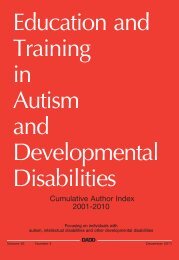Teaching Money Computation Skills to High School Students with ...
Teaching Money Computation Skills to High School Students with ...
Teaching Money Computation Skills to High School Students with ...
You also want an ePaper? Increase the reach of your titles
YUMPU automatically turns print PDFs into web optimized ePapers that Google loves.
problems employed in this study presented<br />
one instance of regrouping <strong>with</strong>in the problem;<br />
therefore, generalization <strong>to</strong> more difficult<br />
skills such as multiple regrouping opportunities<br />
or regrouping <strong>with</strong> zero in the<br />
problem should be examined.<br />
References<br />
Alber<strong>to</strong>, P. A., & Troutman, A. C. (2009). Applied<br />
behavior analysis for teachers (8 th ed.). Upper Saddle<br />
River, NJ: Pearson Education, Inc.<br />
Browder, D. M., & Grasso, E. (1999). <strong>Teaching</strong><br />
money skills <strong>to</strong> individuals <strong>with</strong> mental retardation:<br />
A research review <strong>with</strong> practical applications.<br />
Remedial and Special Education, 20, 297–308.<br />
Browder, D. M., Spooner, F., Ahlgrim-Delzell, L.,<br />
Harris, A., & Wakeman, S. Y. (2008). A metaanalysis<br />
on teaching mathematics <strong>to</strong> students <strong>with</strong><br />
significant cognitive disabilities. Exceptional Children,<br />
74, 407–432.<br />
Bullock, J., Pierce, S., & McClellan, L. (1989). Touch<br />
Math. Colorado Springs, Co: Innovative Learning<br />
Concepts.<br />
Butler, F. M., Miller, S. P., Kit-hung, L., & Pierce, T.<br />
(2001). <strong>Teaching</strong> mathematics <strong>to</strong> students <strong>with</strong><br />
mild-<strong>to</strong>-moderate mental retardation: A review of<br />
the literature. Mental Retardation, 39, 20–31.<br />
Cihak, D., & Foust, J. (2008). Comparing number<br />
lines and <strong>to</strong>uch points <strong>to</strong> teach addition facts <strong>to</strong><br />
students <strong>with</strong> autism. Focus on Autism and Other<br />
Developmental Disabilities, 23, 131–137.<br />
Cooper, J. O., Heron, T. E., & Heward, W. L.<br />
(2007). Applied behavior analysis (2 nd ed.). Upper<br />
Saddle River, NJ: Merrill.<br />
Fletcher, D., Boon, R., & Cihak, D. (2010). Effects of<br />
the TouchMath program compared <strong>to</strong> a number<br />
line strategy <strong>to</strong> teach addition facts <strong>to</strong> middle<br />
school students <strong>with</strong> moderate intellectual disabilities.<br />
Education and Training in Autism and Developmental<br />
Disabilities, 45, 449–458.<br />
Harrison, P. L., & Oakland, T. (2003), Adaptive Behavior<br />
Assessment System (2nd ed.). San An<strong>to</strong>nio,<br />
TX: The Psychological Corporation.<br />
Individuals <strong>with</strong> Disabilities Education Improvement<br />
Act of 2004, 20 U. S. C. §§ 1400–1485 (2004<br />
supp. IV), Pub. L. No. 108–446 (2004), 108 th<br />
Congress, Second Session.<br />
Jitendra, A. K., & Xin, Y. (1997). Mathematical<br />
problem solving instruction for students <strong>with</strong><br />
mild disabilities and students at risk for math<br />
failure: A research synthesis. The Journal of Special<br />
Education, 30, 412–438.<br />
Kramer, T., & Krug, D. A. (1973). A rationale and<br />
procedure for teaching addition. Education and<br />
Training of the Mentally Retarded, 8, 140–145.<br />
Kroesbergen, E. H., & Van Luit, J. (2003). Mathematics<br />
interventions for children <strong>with</strong> special educational<br />
needs: A meta-analysis. Remedial and Special<br />
Education, 24, 97–114.<br />
Mastropieri, M. A., Bakken, J. P., & Scruggs, T. E.<br />
(1991). Mathematics instruction for individuals<br />
<strong>with</strong> mental retardation: A perspective and research<br />
synthesis. Education and Training in Mental<br />
Retardation, 26, 115–129.<br />
Miller, S. P., Butler, F. M., & Lee, K. (1998). Validated<br />
practices for teaching mathematics <strong>to</strong> students<br />
<strong>with</strong> learning disabilities: A review of literature.<br />
Focus on Exceptional Children, 31, 1–24.<br />
National Council of Teachers of Mathematics.<br />
(2000). Principles and NCTM Standards for school<br />
mathematics. Res<strong>to</strong>n, VA: The National Council of<br />
Teachers of Mathematics, Inc.<br />
No Child Left Behind Act of 2001, Public Law 107–<br />
110, 107 th Congress, First Session.<br />
Scott, K. S. (1993). Multisensory mathematics for<br />
children <strong>with</strong> mild disabilities. Exceptionality, 4,<br />
97–111.<br />
Simon, R., & Hanrahan, J. (2004). An evaluation of<br />
the <strong>to</strong>uch math method for teaching addition <strong>to</strong><br />
students <strong>with</strong> learning disabilities in mathematics.<br />
European Journal of Special Needs Education, 19,<br />
191–209.<br />
Swanson, H. L., & Jerman, O. (2006). Math disabilities:<br />
A selective meta-analysis of the literature.<br />
Review of Educational Research, 76, 249–274.<br />
U. S. Department of Education. (2007). Twentyninth<br />
annual report <strong>to</strong> Congress on the implementation<br />
of the Individuals <strong>with</strong> Disabilities Education Act<br />
(IDEA). Washing<strong>to</strong>n, DC: Author.<br />
Wechsler, D. (1991). Wechsler Intelligence Scale for<br />
Children-Third Edition. San An<strong>to</strong>nio, TX: Psychological<br />
Corporation.<br />
Wolf, M. M. (1978). Social validity: The case for<br />
subjective measurement or how applied behavioral<br />
analysis is finding its heart. Journal of Applied<br />
Behavior Analysis, 11, 203–214.<br />
Woodcock, R. W., McGrew, K. S., & Werder, J. K.<br />
(1994). Woodcock-McGrew-Werder Mini-Battery of<br />
Achievement. Chicago, IL: Riverside Publishing.<br />
Xin, Y. P., & Jitendra, A. K. (1999). The effects of<br />
instruction in solving mathematical word problems<br />
for students <strong>with</strong> learning problems: A metaanalysis.<br />
The Journal of Special Education, 32, 207–<br />
225.<br />
Received: 7 September 2010<br />
Initial Acceptance: 2 November 2010<br />
Final Acceptance: 23 February 2011<br />
Touchmath© and <strong>Money</strong> <strong>Skills</strong> / 555

















